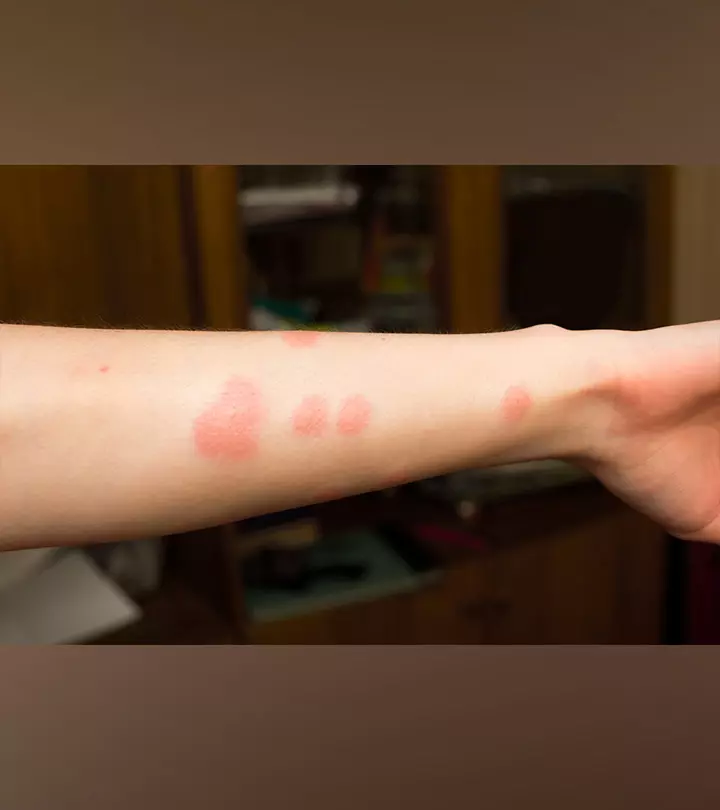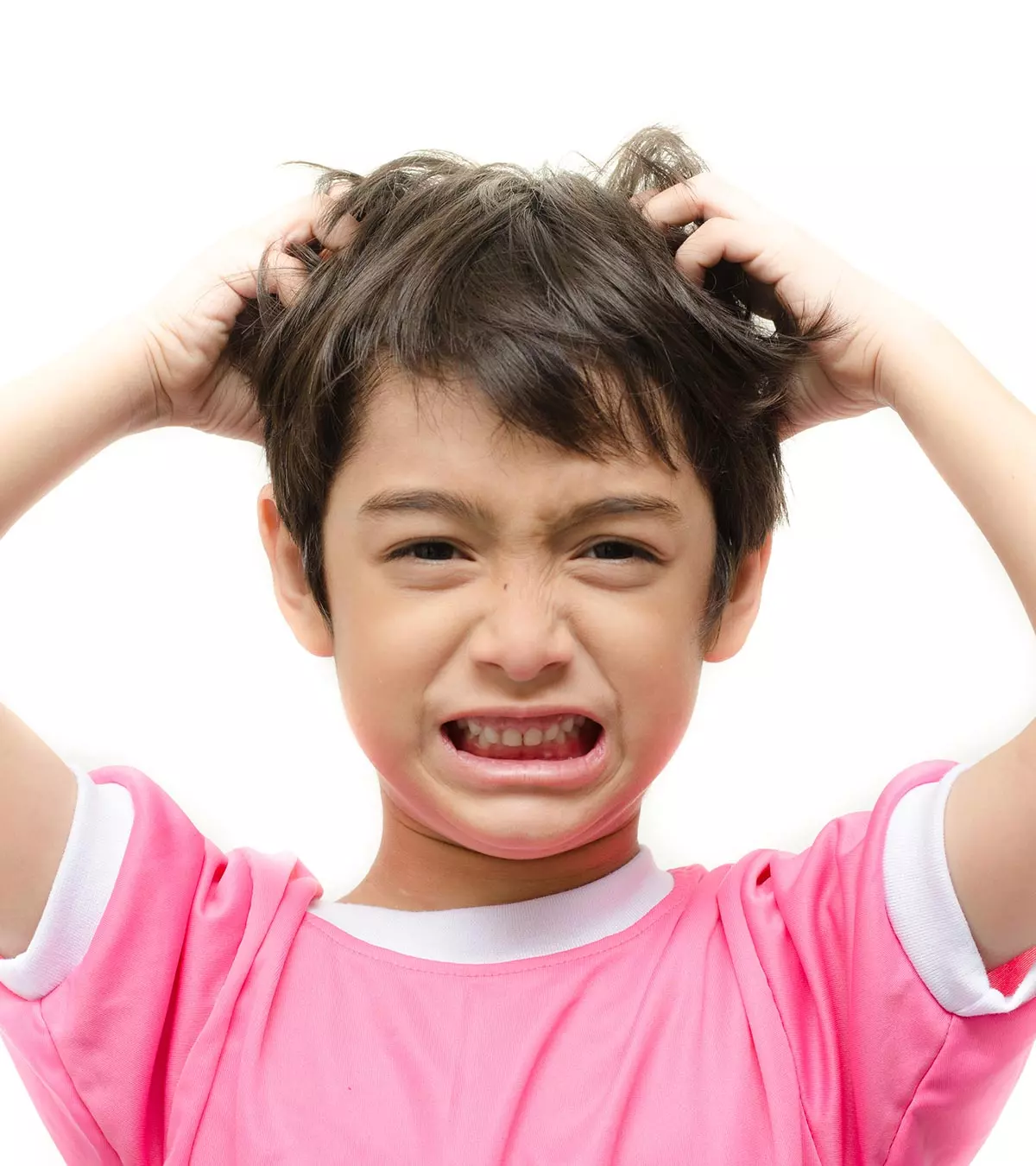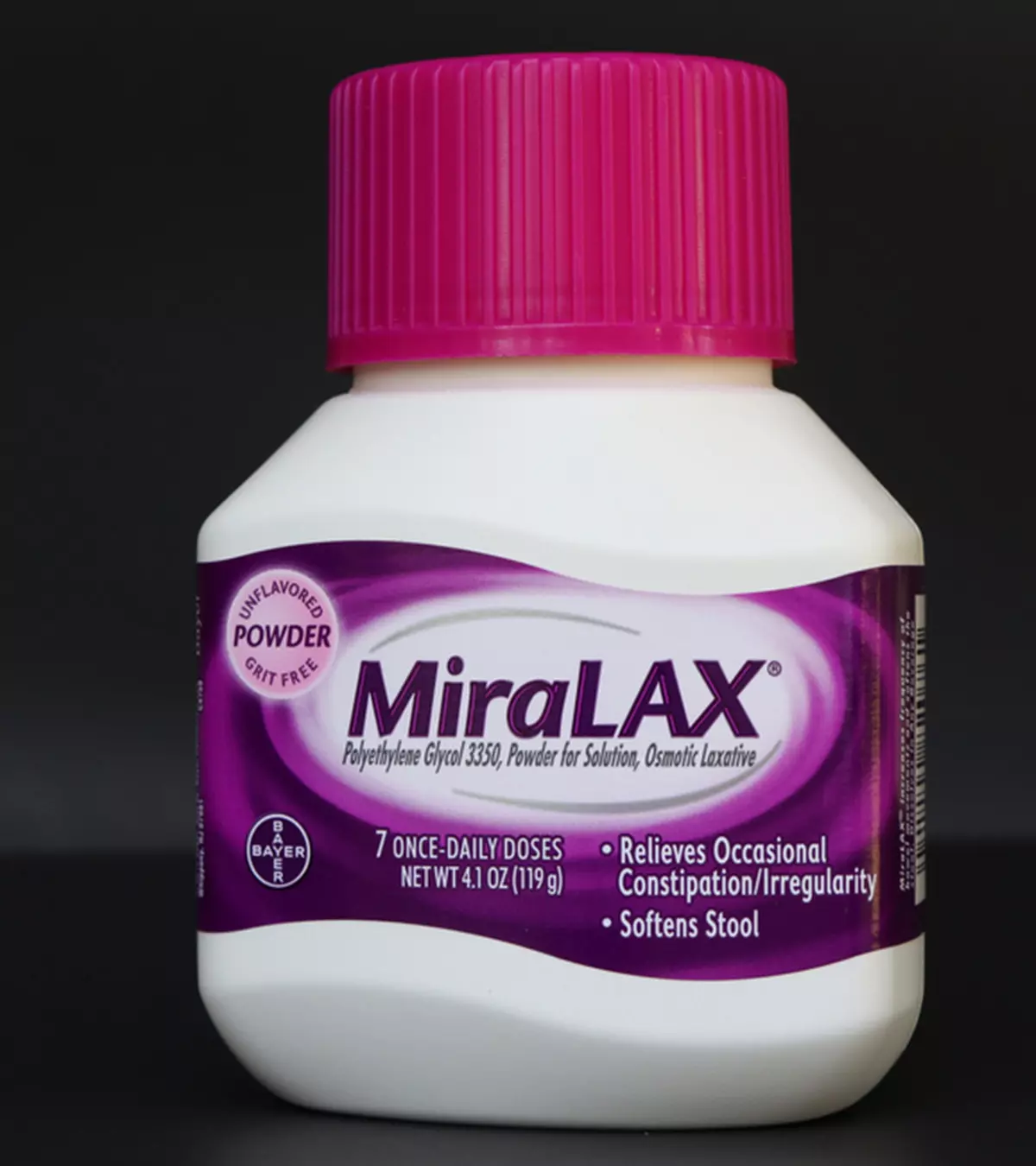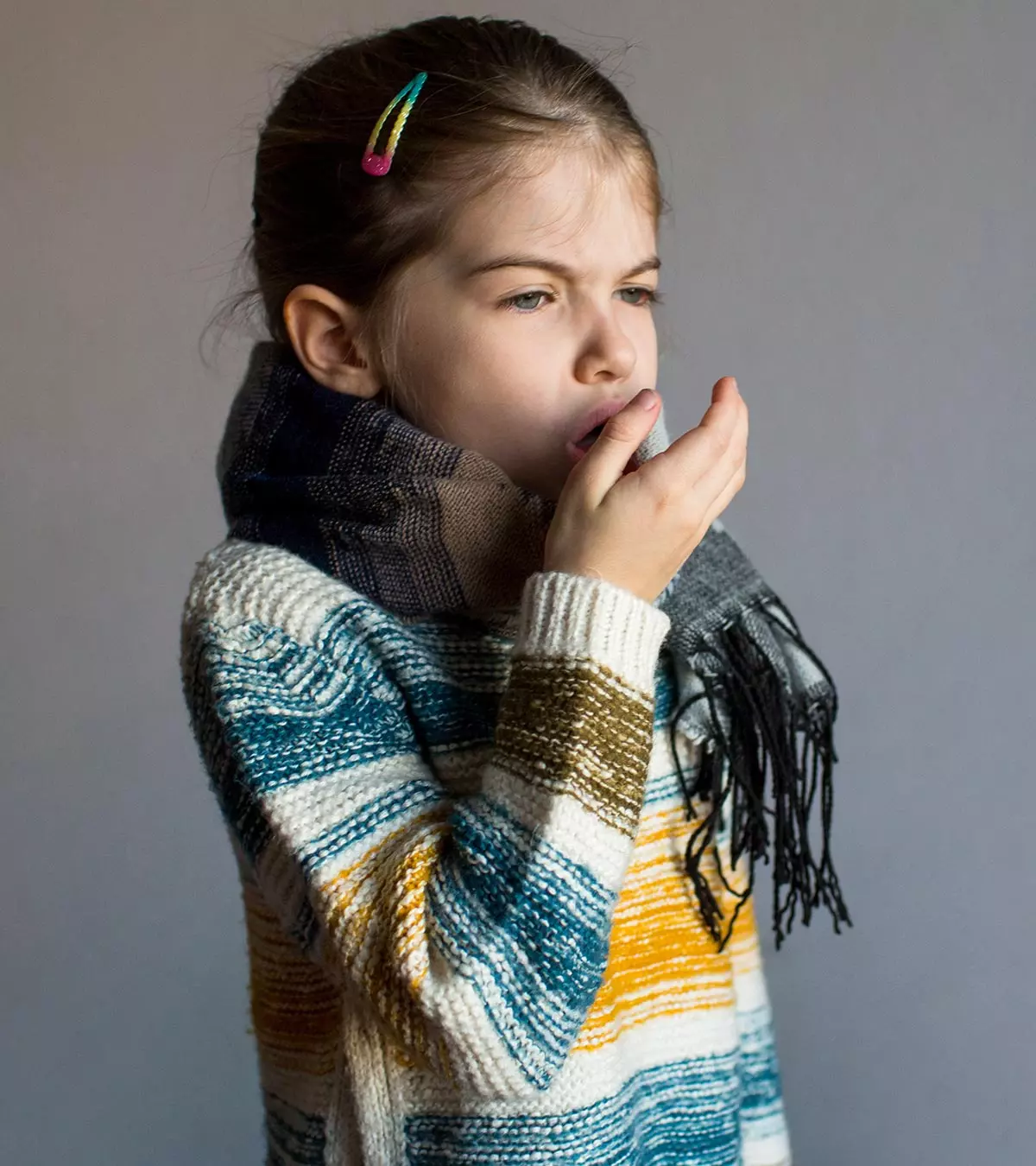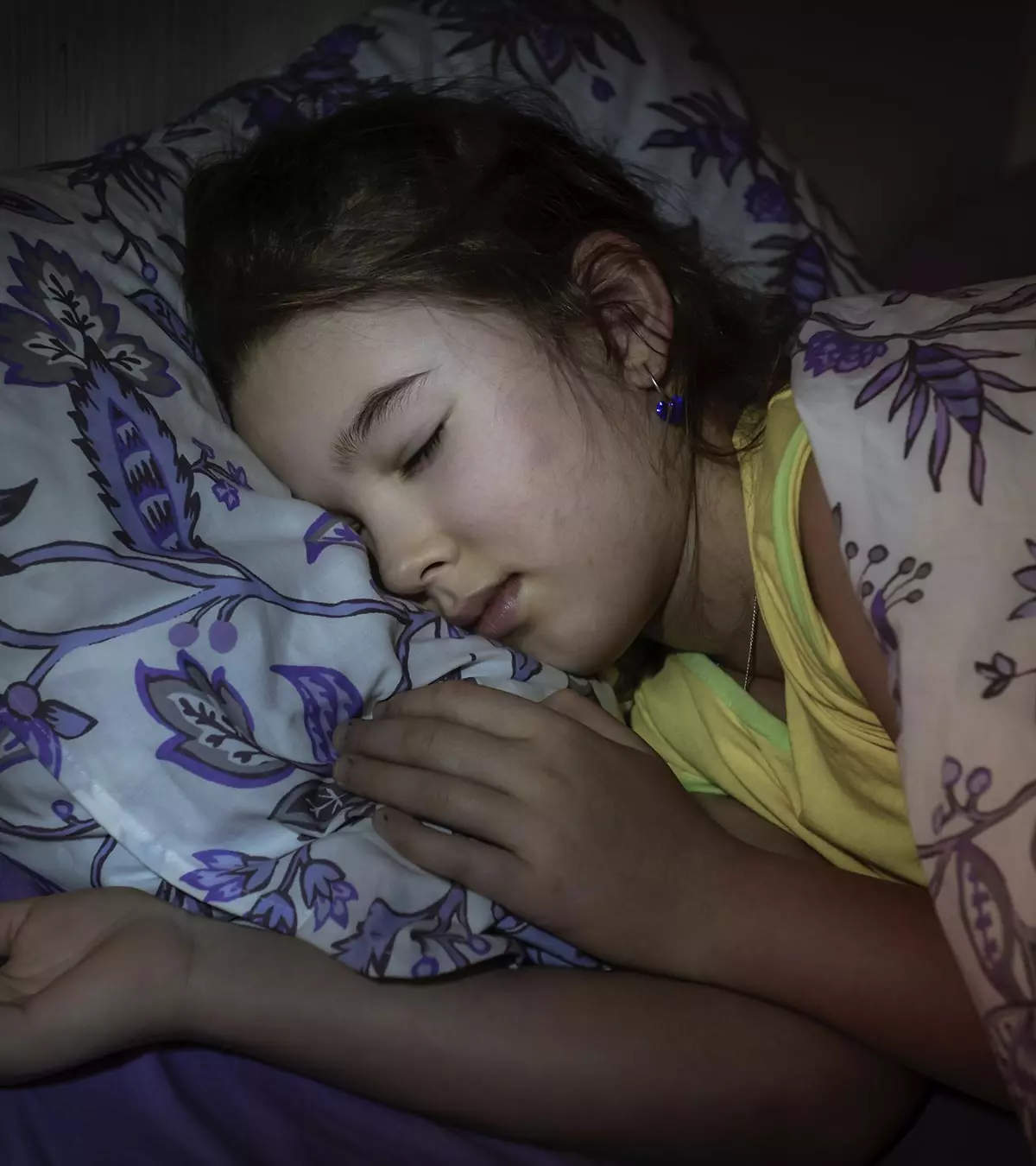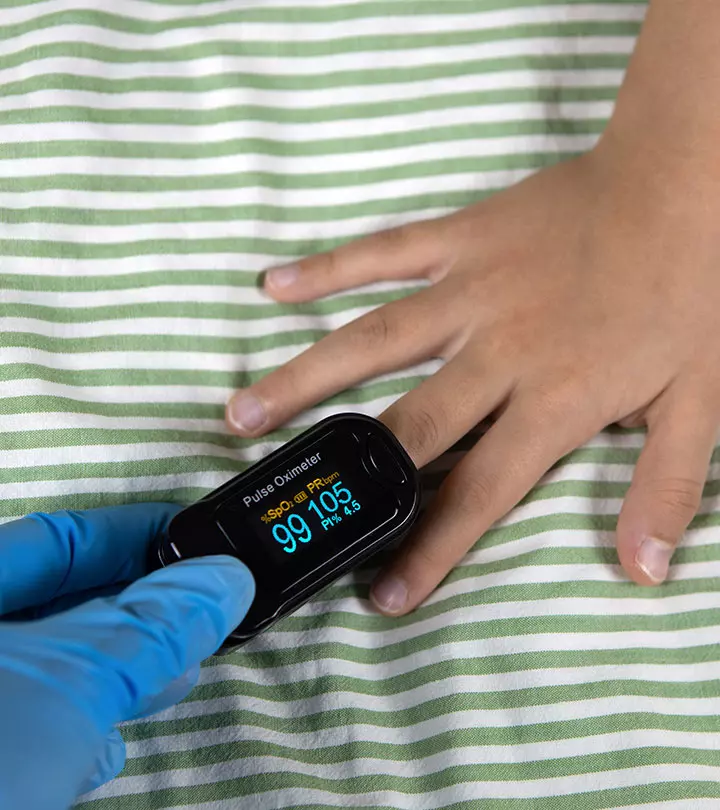
Image: Shutterstock

Bronchitis in kids is a viral or bacterial lower respiratory infection characterized by the inflammation of the lining of the large breathing tubes (bronchi). This lining makes mucusiA sticky material that covers the lining of the lungs, throat, mouth, and sinus and provides protection and lubrication and protects the underlying tissues. It causes a lot of mucus production, which can lead to airway obstruction and make it difficult for the air to pass through and reach the bronchi. The main symptom of the infection is cough. Children may have dry coughs or wet coughs with mucus (1) (2).
Read the post to know about the types, causes, symptoms, diagnosis, and treatment of bronchitis in children.
Key Pointers
- Bronchitis is caused by a bacterial or viral infection, which results in inflammation of the bronchi.
- Physical symptoms of bronchitis include coughing, throat irritation, chest tightness, headaches, fever, and breathing difficulties.
- Bronchitis can lead to severe consequences such as pneumonia and heart or respiratory failure.
- Possible interventions for bronchitis may include the administration of acetaminophen or antibiotics depending upon the underlying cause and the child’s health history and overall wellness.
Types And Causes Of Bronchitis In Children
Bronchitis-causing pathogens spread through the mucus and respiratory droplets of the infected person (1) (3) (4).
1. Acute bronchitis
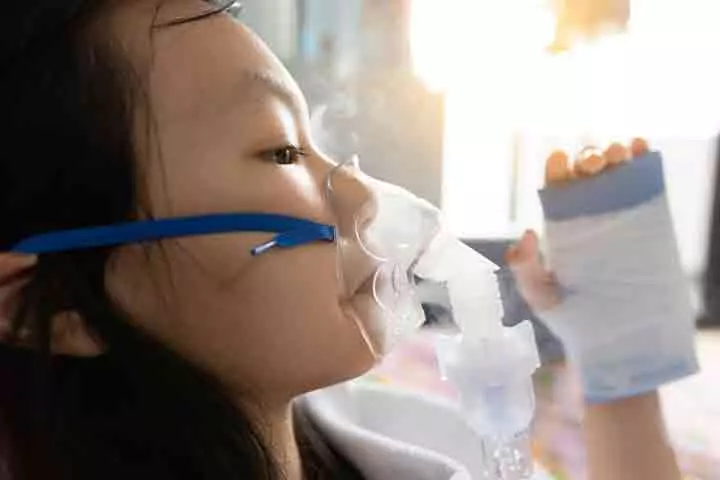
Image: Shutterstock
- It is a temporary inflammation of the bronchi caused by bacteria or viruses.
- It may also be caused by dust, allergens, fumes, cleaning chemicals, or tobacco smoke.
- Acute bronchitis usually occurs after a common cold or upper respiratory tract infection.
- Although it may affect people of all ages, it is most common in children under five. Acute bronchiolitis is also common in children between two months and two years.
- The infection is mostly mild but may be severe in some cases, specially in young infants. It usually lasts for a short duration.
 Quick fact
Quick fact2. Chronic bronchitis
- The main cause of the infection is smoking and being around tobacco smoke or chemical fumes for a long time.
- It is rare in children and mostly affects people over 40.
- The infection may be mild or severe and may last several months to years.
Signs And Symptoms Of Bronchitis In Children
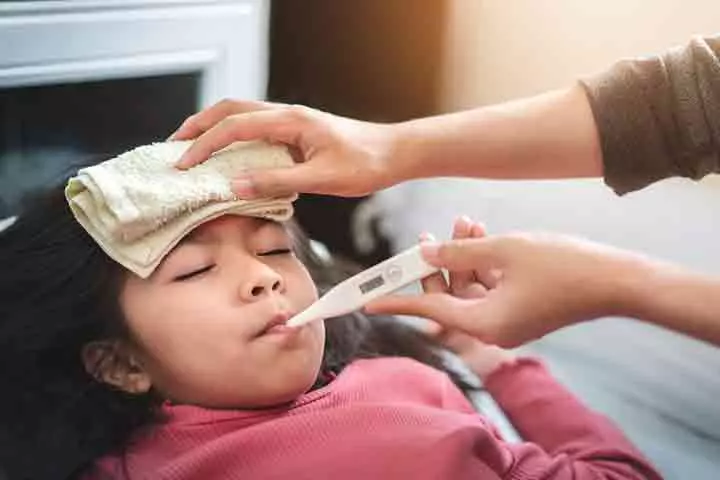
Image: Shutterstock
The primary symptom of the condition is a dry, non-productive cough or wet cough with thick yellow, white, or green mucus. Children usually cannot expectorate the mucus. Instead they swallow it and it comes out when they vomit. Children may also experience the following symptoms (1) (4).
- Runny nose
- Sore throat
- Chest congestion or tightness
- Headache
- Fever
- Discomfort in the body
- Muscle pain
- Shortness of breath
- Difficulty in feeding or sucking from mother’s breast
- Wheezingi A condition where breathing causes high-pitched whistling sounds because the air passages become narrow due to inflamed bronchi
- Cough-induced vomiting
The symptoms may last for a few days to weeks; however, the cough may stay for some time even after the symptoms have disappeared (3).
You should see a doctor if children have (3) (5):
- A temperature of 100.4°F (38°C) or higher
- A high temperature for more than three days (the sign of flu or pneumonia)
- Cough with blood in mucus
- Shortness of breath
- Feeding difficulty
- Frequent bronchitis
Risks And Complications Of Bronchitis In Children
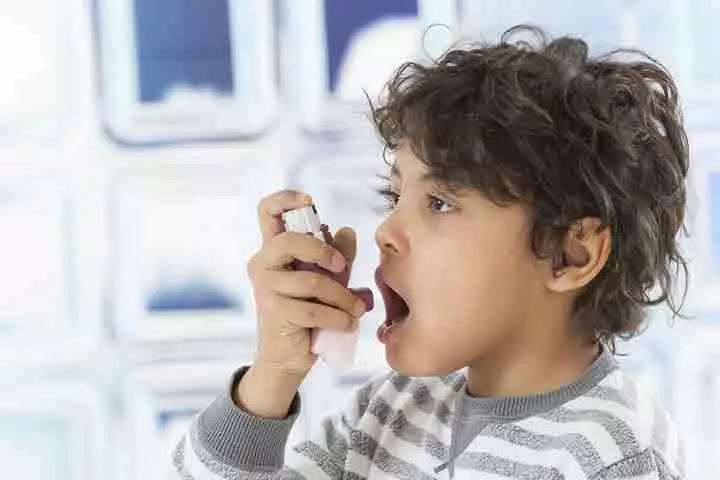
Image: Shutterstock
The following factors may increase the child’s risk of developing bronchitis or bronchiolitis (6).
- Allergies
- Chronic sinusitis
- Asthma
- Enlarged tonsilsi A pair of round, soft tissue masses at the back of the throat and adenoidsiA soft mass of tissue located behind the nasal cavity
- Secondhand smoke
- Congenital heart disease
- Underlying immunodeficiency disorder
- Incomplete vaccinations
Most children recover without major issues. Bronchitis may sometimes lead to pneumonia, the most common complication. Pneumonia occurs when the lungs’ air sacs are infected and fill up with fluid (3). In severe cases, acute bronchiolitis may complicate into heart failure, convulsions or respiratory failure.
Prematurely born babies are at a higher risk of developing respiratory infections, bronchitis being the most prevalent infection. As the graph below depicts, respiratory infections such as pneumonia and bronchitis are more common for very preterm-born children, resulting in impaired lung function in adulthood. Late preterm-born children also tend to have reduced lung function, greater respiratory symptoms, and a greater risk of respiratory infections in youth. Nevertheless, their rates of respiratory illness are lower than those of very preterm-born children.

Hospital admissions of moderately/late preterm-born children with lower respiratory tract infections
Source: Does the sex of the preterm baby affect respiratory outcomes?; Breathe/Pediatric PulmonologyDiagnosis Of Bronchitis In Children
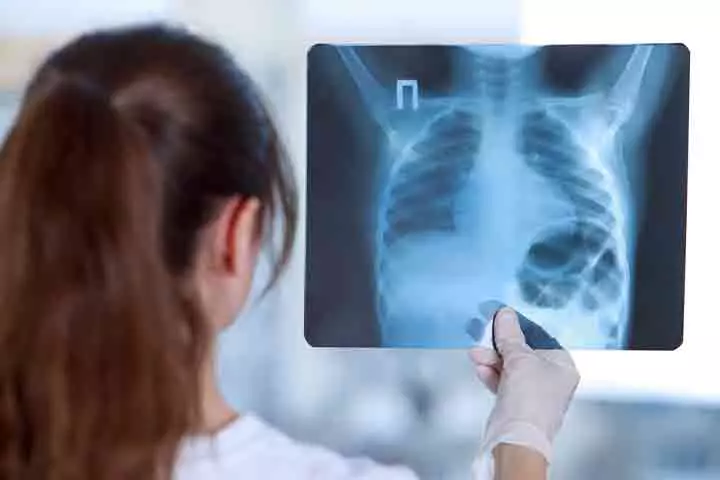
Image: Shutterstock
Healthcare providers diagnose bronchitis in children based on the medical history and physical examination. They check the child’s chest to detect wheezing or congestion during the examination. They also suggest diagnostic tests to rule out further complications (4) (6).
- Chest X-ray to detect any sign of infection in the tissues, organs, and bones. Chest X ray in acute bronchiolitis usually shows bilateral air trapping. It is not always required and depends on the discretion of the clinician.
- Pulse oximetry to measure the amount of oxygen in the blood.
- SputumiA thick material combined with saliva that comes up from the mouth while coughing and nasal discharge sample test (culture and PCR ) to detect the germs causing the infection.
- Blood tests to check for blood cell count, blood culture if necessary .
- SpirometryiA test that determines how efficiently your lungs function by measuring the amount of air passing in and out while breathing to detect asthma signs in some children.
Treatment For Bronchitis In Children

Image: Shutterstock
Acute bronchitis gets better on its own; however, doctors may suggest some treatments based on the child’s medical history, overall health, and the condition’s severity (1) (3) (4).
- Antibiotics are often not prescribed since most bronchitis infections are viral. Nevertheless, the doctor may prescribe antibiotics if the causative agent is detected to be bacteria. Pediatricians may also suggest antibiotics if:
- There is an increased risk of pneumonia
- The child has a weak immune system
- There is a history of lung, heart, kidney, and liver disease
- Acetaminophen or paracetamol is given to treat fever.
 Point to consider
Point to consider- Cough medications may be given to children when prescribed by the doctor. They should never be self prescribed.
- Bronchodilators or other anti-asthma medicines may be suggested in case of persistent coughs and wheezing in kids. These medicines are given through inhalers or nebulizers, and some may be given orally also.
Discover the causes, symptoms, and treatments of acute bronchitis in this informative video. Get the facts on how to prevent and manage this common respiratory condition.
Home Remedies For Bronchitis
Bronchitis in children may be managed at home through the following remedies (5) (7).
- Allow them to rest well.
- Give plenty of fluid to prevent dehydration, along with nutritious food.
- Use a cool-mist humidifier to help breathe comfortably.
- Use a saline nasal spray to decongest a stuffy nose. Parents may use a rubber suction bulb to clear mucus for young children.
Here are some natural remedies that may also work.
- Encourage older children to gargle with warm salt water as it helps to soothe the sore throat.
- Older children may also try steam inhalation which helps to loosen mucus. They may also turn on the bathroom shower and let the room fill with steam.
- Pineapple suppresses cough and loosens mucus as it contains a protein-digesting enzyme called bromelain.
- Grapes help to release mucus from the affected respiratory passages.
- Probiotics may be given to children to strengthen their immune systems. However, you should take a doctor’s opinion (8).
 Quick tip
Quick tipPrevention Of Bronchitis In Children
Prevention of bronchitis is possible by following these tips (1) (2) (9).
- Wash hands with soap and warm water.
- Do not touch the face often.
- Use your elbow or a tissue to cough or sneeze.
- Do not let children be around secondhand tobacco smoke.
- Encourage children to wear masks near irritants, such as automobile smoke, dust, or chemical fumes.
- Ensure that your child gets the flu shot every year and all other routine vaccines on time.
 Things to know
Things to knowFrequently Asked Questions
1. How long can bronchitis last in kids?
The bronchitis symptoms persist for one to two weeks, but the cough may last for three to four weeks (10). If the symptoms don’t resolve, it is better to consult the doctor.
2. Can a child go to school with bronchitis?
A child with bronchitis should stay home until the cough and fever subside without medications. Once they feel better, they may go to school (11) (12).
3. How do I tell if my child has bronchitis or pneumonia?
Both pneumonia and bronchitis share common symptoms, such as cough, tiredness, and yellow or green sputum. But bronchitis is mainly caused by viruses and pneumonia by bacteria. In addition, pneumonia is characterized by high persistent fever and chills, unlike bronchitis (13).
4. What is the difference between bronchiolitis and bronchitis?
Bronchitis and bronchiolitis are similar-sounding terminologies related to respiratory illness. They even have similar symptoms but are different in terms of the location where the respiratory system is affected. Bronchitis is an inflammation of the bronchi, which is more common in older children and adults. Conversely, bronchiolitis refers to inflamed bronchioles and is more common in children below two years of age. Bronchiolitis is mainly caused by a viral infection, the most common being the respiratory syncytial virus (RSV). However, bronchitis may be viral, bacterial, or related to pollution and cigarette smoking (14)(15)(16).
Bronchitis in children is usually not serious and rarely requires hospitalization, but early treatment is necessary to avoid complications. If you feel your child is showing bronchitis symptoms, start with home remedies to prevent the infection from growing. Take advice from your doctor on appropriate treatment options.
Illustration: Bronchitis In Kids: Treatment Symptoms And Home Remedies

Image: Dall·E/MomJunction Design Team
Infographic: Home Management And Remedies For Bronchitis In Children
Bronchitis and its symptoms subside on their own in a few days to weeks. However, following some home remedies and management tips, as mentioned in the following infographic, can help the affected children. Although cough medications and antibiotics, as prescribed by a physician, are necessary, home management can ensure a faster recovery.
Some thing wrong with infographic shortcode. please verify shortcode syntaxReferences
- Bronchitis.
https://kidshealth.org/en/parents/bronchitis.html - Bronchitis.
https://raisingchildren.net.au/guides/a-z-health-reference/bronchitis - Bronchitis.
https://www.nhs.uk/conditions/bronchitis/ - Acute Bronchitis.
https://www.cincinnatichildrens.org/health/a/acute-bronchitis - Chest Cold (Acute Bronchitis) Basics.
https://www.cdc.gov/acute-bronchitis/about/?CDC_AAref_Val=https://www.cdc.gov/antibiotic-use/bronchitis.html - Bronchitis.
https://www.urmc.rochester.edu/encyclopedia/content?ContentTypeID=90&ContentID=P02930 - Do Any Bronchitis Home Remedies Actually Work?
https://health.clevelandclinic.org/bronchitis-home-remedies - Shahnaz Sultana et al.; (2016); Cough Suppressant Herbal Drugs: A Review.
http://www.ijpsi.org/Papers/Vol5(5)/D0505015028.pdf - Acute Bronchitis.
https://www.chestnet.org/membership-and-community/philanthropy?gclid=CjwKCAiAh_GNBhAHEiwAjOh3ZFveoH0D5N83_nWEh7rIx3ctj231WgPrlxhigfNFCyYoB3udpjkA3BoCyTkQAvD_BwE?Item=Symptoms?Item=Diagnosis - Acute Bronchitis in Children.
https://www.cedars-sinai.org/health-library/diseases-and-conditions—pediatrics/a/acute-bronchitis-in-children.html#:~:text=These%20symptoms%20often%20last%207healthcare%20provider%20for%20a%20diagnosis. - WHEN SHOULD MY SICK CHILD STAY HOME FROM SCHOOL?
https://healthcare.utah.edu/the-scope/kids-zone/all/2025/09/basics-when-should-my-sick-child-stay-home-school - Bronchitis.
https://cdnsm5-ss1.sharpschool.com/UserFiles/Servers/Server_20241558/File/Health%20Services/Bronchitis.pdf - Bronchitis or pneumonia? How to tell the difference.
https://www.uchealth.org/today/bronchitis-or-pneumonia-how-to-tell-the-difference/ - Bronchiolitis.
https://my.clevelandclinic.org/health/diseases/8272-bronchiolitis - Bronchiolitis.
https://www.rch.org.au/kidsinfo/fact_sheets/bronchiolitis/ - Evelyn N. Erickson et al.; (2025); Pediatric Bronchiolitis.
https://www.ncbi.nlm.nih.gov/books/NBK519506/ - Acute Bronchitis in Children.
https://www.stanfordchildrens.org/en/topic/default?id=acute-bronchitis-in-children-90-P02930
Community Experiences
Join the conversation and become a part of our nurturing community! Share your stories, experiences, and insights to connect with fellow parents.
Read full bio of Dr. Shaon Mitra
Read full bio of Pragya Bhargavi
Read full bio of Dr. Ritika Shah
Read full bio of Dr. Joyani Das








